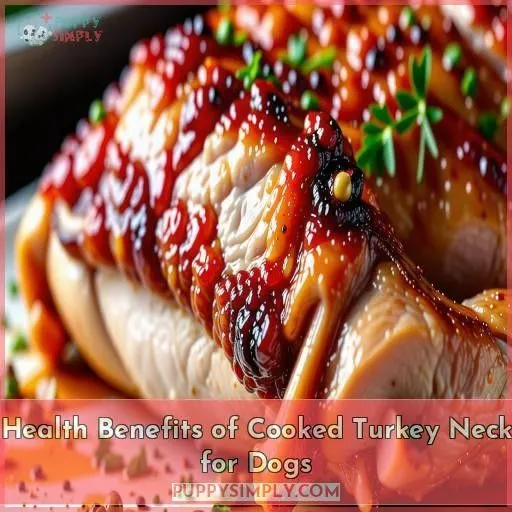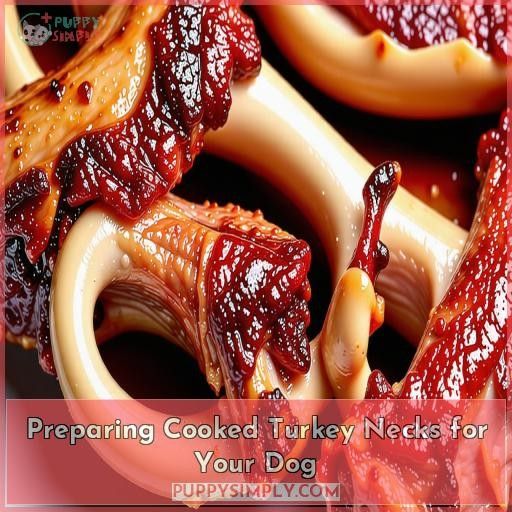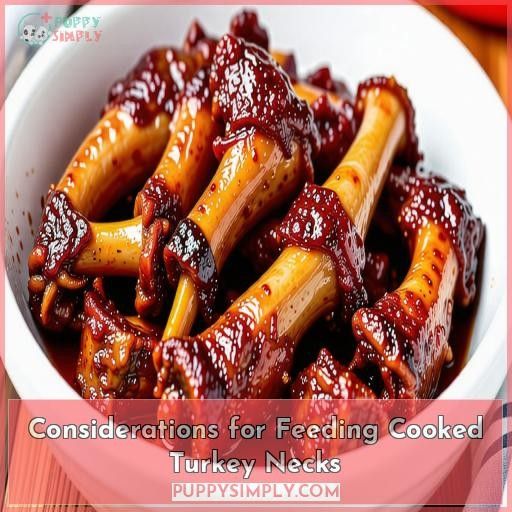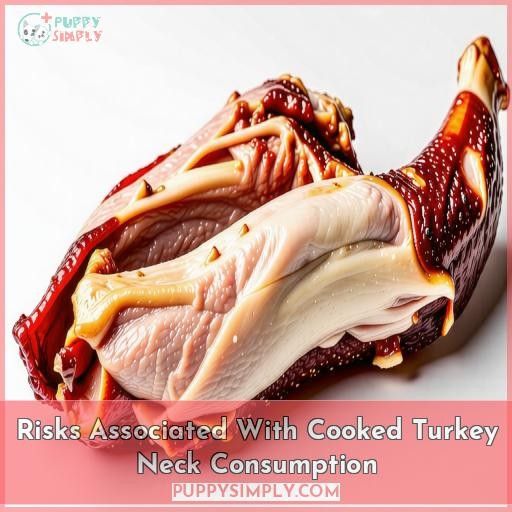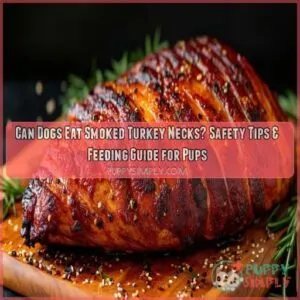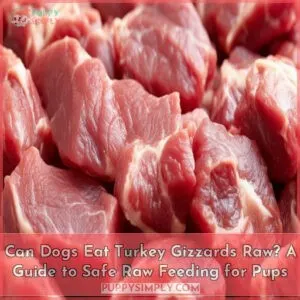This site is supported by our readers. We may earn a commission, at no cost to you, if you purchase through links.
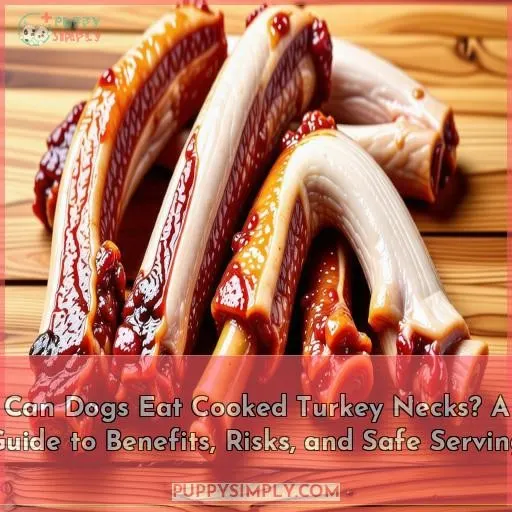 Yes, you can feed your dog cooked turkey necks in moderation as a nutritious treat.
Yes, you can feed your dog cooked turkey necks in moderation as a nutritious treat.
These protein-rich neck bones provide glucosamine, chondroitin, and calcium for joint and dental health.
However, supervise your pup closely while they enjoy this crunchy snack to prevent choking hazards. Cut the cooked necks into appropriate sizes based on your dog’s breed and chew ability.
Serve no more than 1-2 portions weekly to avoid digestive issues.
With proper precautions, cooked turkey necks make a rewarding, nutrient-packed chew.
You’ll learn more about safely incorporating them into your furry friend’s diet.
Table Of Contents
- Key Takeaways
- Can Dogs Eat Cooked Turkey Necks?
- Can Dogs Safely Eat Cooked Turkey Necks?
- Health Benefits of Cooked Turkey Neck for Dogs
- Preparing Cooked Turkey Necks for Your Dog
- Considerations for Feeding Cooked Turkey Necks
- Risks Associated With Cooked Turkey Neck Consumption
- Frequently Asked Questions (FAQs)
- Are boiled turkey necks safe for dogs?
- Can dogs eat cooked neck bones?
- How to cook a turkey neck for a dog?
- Are boiled turkey necks healthy?
- Can I feed turkey necks to puppies?
- How often should I feed turkey necks?
- Are turkey necks safe for overweight dogs?
- Can I feed turkey necks to small dogs?
- Are turkey necks a complete and balanced meal?
- Conclusion
Key Takeaways
- Cooked turkey necks can be a nutritious treat for dogs when fed in moderation, providing protein, glucosamine, chondroitin, and calcium for joint and dental health.
- Proper preparation is crucial – choose fresh necks, rinse them thoroughly, cut into appropriate portions, remove excess fat or skin, and cook thoroughly until browned and tender.
- Portion sizes should be based on your dog’s size, and turkey necks should be served as an occasional treat, not a regular part of their diet. Supervise closely during feeding to prevent choking hazards.
- Potential risks include choking hazards from cooked bones, gastrointestinal issues, and bacterial contamination. Consult with a veterinarian before introducing turkey necks, especially for dogs with dental issues or other health concerns.
Can Dogs Eat Cooked Turkey Necks?
Yes, dogs can eat cooked turkey necks in moderation as a treat, but it’s important to account for the potential risks and benefits. Cooked turkey necks can provide protein, nutrients, and dental benefits for dogs, but they may also pose choking hazards or cause digestive issues if not prepared and served properly.
Can Dogs Safely Eat Cooked Turkey Necks?
Yes, dogs can safely eat cooked turkey necks in moderation, but there are some important considerations.
Cooked turkey necks are soft and brittle, not sharp or pointy, making them less likely to cause obstructions or punctures. However, they should still be supervised while eating to prevent choking hazards, especially for smaller dogs.
Introduce turkey necks gradually to avoid digestive upset, and consult your vet if your dog has any allergies or dietary restrictions. Senior dogs or those with dental issues may need extra care.
Limit servings to 1-2 times per week as part of a balanced diet.
With proper precautions, cooked turkey necks can be a tasty and nutritious treat for most dogs.
Health Benefits of Cooked Turkey Neck for Dogs
You’ve likely heard that turkey necks make nutritious and satisfying treats for dogs, and it’s true – they’re packed with protein to support strong muscles and lean body mass. Cooked turkey necks also deliver valuable nutrients like glucosamine and chondroitin to promote healthy joints, as well as calcium for strong teeth and bones.
Protein-Rich Neck Treats
Cooked turkey necks are a protein-rich treat that can provide a nutritional boost for your canine companion. The high-quality protein supports muscle growth and development, while the cooking process makes the necks safe for consumption. Serve cooked turkey necks as an occasional treat, ensuring proper portion sizes and monitoring your dog during feeding to prevent choking hazards.
- Protein-rich for muscle growth and development
- Cooking process makes turkey necks safe for dogs
- Serve as an occasional treat in moderation
Joint and Dental Health
Cooked turkey necks are a natural source of glucosamine and chondroitin, which support joint health and mobility (Source). The soft texture helps remove plaque and tartar, promoting dental health(Source). Serve 1/2 to 1 neck 2-3 times weekly, cooking for 20-30 minutes until tender . Supervise dogs and guarantee proper chewing to avoid choking .
Nutrient-Packed Snacks
Cooked turkey necks are nutrient-packed snacks that provide lean protein, essential amino acids, and vitamins like B3 for your dog’s health. However, cooked bones can splinter, causing choking hazards or internal injuries. Avoid feeding cooked turkey necks to prevent:
- Esophageal obstruction
- Tracheal damage
- Bacterial infections from raw meat
Preparing Cooked Turkey Necks for Your Dog
When preparing cooked turkey necks for your dog, it’s imperative to guarantee safe cooking practices. Commence by selecting fresh, premium turkey necks and then rinsing them thoroughly to remove any debris. Cut the necks into appropriate portions, removing any excess fat or skin. Exercise caution when cooking, opting for boiling, grilling, or baking methods until browned and tender. Once cooked, you can serve the turkey neck chews as standalone treats, mixed with kibble, or chopped into smaller pieces. Remember to thoroughly cook the turkey necks to avoid bacterial contamination and supervise your dog while it’s eating to prevent choking hazards. Ensure proper storage guidelines to avoid any risk of bacterial contamination and gastrointestinal blockage. Additionally, if your dog has compromised tooth health or health conditions, consult a veterinarian before introducing turkey necks into its diet (Source).
| Turkey Neck Preparation Tips | Cooking Methods | Serving Suggestions |
|---|---|---|
| Choose fresh, high-quality turkey necks | Boiling: 30 minutes or until tender | Standalone treat |
| Rinse necks thoroughly to remove debris | Grilling: 20-30 minutes or until browned | Mix with kibble or other ingredients |
| Cut necks into appropriate portion sizes | Baking: 20-30 minutes or until browned | Chopped into smaller pieces |
| Remove excess fat or skin | Supervise dog while eating |
Considerations for Feeding Cooked Turkey Necks
When considering feeding cooked turkey necks to your dog, it’s essential to understand the appropriate serving sizes and frequency. Moderation is key, as turkey necks should be an occasional treat rather than a substantial part of your dog’s regular diet.
Discussion Points
When feeding cooked turkey necks to your dog, it’s important to keep in mind potential choking hazards. While raw turkey necks are generally safe, cooked bones can splinter and cause internal injuries. Senior dogs or those with dental issues may need extra precautions. Portion sizes should be appropriate for your dog’s size, and always supervise during feeding.
- Choking hazards with cooked bones
- Raw versus cooked turkey necks
- Considerations for senior dogs and dental health
- Appropriate portion sizes for your dog
Nutritional Benefits of Turkey Necks
Turkey necks are a nutritious treat for dogs, packed with lean protein, glucosamine, chondroitin, and essential vitamins. These benefits support joint health, strong bones and teeth, and overall well-being. However, it’s important to note portion sizes, your dog’s individual needs, and potential risks before incorporating cooked turkey necks into their diet. Always consult with your veterinarian for personalized guidance.
| Nutrient | Benefits |
|---|---|
| Protein | Supports muscle growth and repair |
| Glucosamine | Promotes healthy joints and cartilage |
| Chondroitin | Reduces inflammation and improves joint mobility |
| Calcium | Strengthens bones and teeth |
| Vitamins B3 and B6 | Support nervous system function |
Preparation and Cooking Methods
When preparing cooked turkey necks for your dog, follow these guidelines:
- Choose fresh, high-quality necks for best nutrition.
- Rinse thoroughly to remove debris before cooking.
- Cut into appropriate portion sizes for safe consumption.
- Remove excess fat or skin to control calorie intake and promote lean protein consumption
Serving Sizes and Frequency
When feeding cooked turkey necks, start with small portions and gradually increase based on your dog’s size. Aim for 1/2 to 1 neck 2-3 times weekly as a protein source. Dehydrated turkey necks are safer than raw, but always supervise your pup to prevent choking. Adjust portions based on your dog’s size and appetite for a healthy, balanced diet.
Risks Associated With Cooked Turkey Neck Consumption
When considering feeding cooked turkey necks to dogs, it’s important to be aware of potential risks.
Cooked bones, including those from turkey necks, can splinter and pose choking hazards or cause gastrointestinal perforations if ingested. There’s a risk of bacterial contamination, especially when turkey bones are cooked.
Dogs with compromised tooth health may also face dental issues from consuming cooked turkey bones.
Consequently, it’s important to make sure that dogs have access to fresh water while consuming turkey necks and to supervise them to prevent any choking incidents.
Frequently Asked Questions (FAQs)
Are boiled turkey necks safe for dogs?
Like strings of jerky, boiled turkey necks are generally safe treats when cooked thoroughly. Verify they’re bite-sized to prevent choking hazards, and supervise your pup while indulging in this crunchy, nutritious snack.
Can dogs eat cooked neck bones?
Yes, dogs can safely eat cooked turkey necks. The bones become soft and digestible after cooking. Supervise closely to prevent choking, and avoid cooked poultry bones as they can splinter dangerously.
How to cook a turkey neck for a dog?
Ha! You think cooking a turkey neck for Fido is as easy as roasting a Thanksgiving bird? Here’s the scoop: Boil or bake that sucker until it’s fall-off-the-bone tender, around 30 minutes. No seasoning needed – let that natural goodness shine.
Are boiled turkey necks healthy?
Yes, boiled turkey necks are healthy for dogs. They provide lean protein, plus glucosamine and chondroitin for joint support. Just be sure to remove all bones and cook thoroughly to avoid risks.
Can I feed turkey necks to puppies?
Yes, you can feed turkey necks to puppies, but in moderation. Introduce them slowly and supervise your pup closely. Make sure the necks are raw or lightly cooked, unseasoned, and sized appropriately for your pup’s age and breed.
How often should I feed turkey necks?
Feed turkey necks 2-3 times per week as treats. Introduce slowly, monitor closely, and cut into sizes appropriate for your dog’s size. Balance turkey necks with a complete diet.
Are turkey necks safe for overweight dogs?
As the adage goes, Moderation is key. Turkey necks can be fed to overweight dogs in moderation as part of a balanced diet. Monitor portions carefully, and provide plenty of exercise to maintain a healthy weight.
Can I feed turkey necks to small dogs?
You should avoid feeding turkey necks to small dogs due to the choking hazard. The necks are too large and pose a significant risk of obstruction in smaller breeds. Stick to softer, appropriately sized treats or chews for toy and miniature dogs.
Are turkey necks a complete and balanced meal?
No, turkey necks alone aren’t a complete diet for dogs. They provide protein and nutrients but lack other essential ingredients for balanced nutrition. You’ll need to supplement with other foods or a high-quality dog food.
Conclusion
Ready to safely incorporate cooked turkey necks into your pup’s diet?
With proper preparation and moderation, these protein-packed treats offer glucosamine, chondroitin, and calcium for joint and dental health.
Always supervise closely, cut into appropriate sizes, and limit to 1-2 portions weekly to avoid digestive issues.


